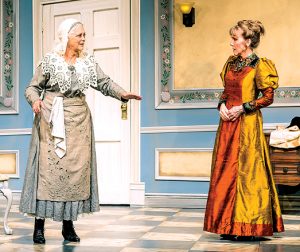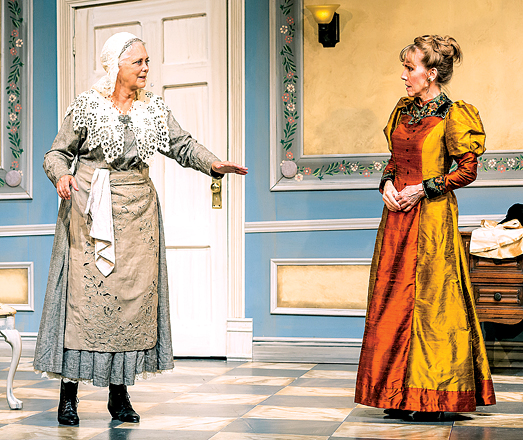Theater Review / A Doll’s House Part 2:
A clever reincarnation at the Waterfront
(Winner of 8 Tony nominations)
By Joanna Brady
I was riveted by A Doll’s House Part 2, now playing at the Waterfront Playhouse. It has all the elements of a terrific production: a very well-written script, perfect casting, superb acting, and a gorgeous Victorian era ‘Michael Boyer’ set. The directing, by Murphy Davis, is more than up to the task, bringing out the humor that relieves the intensity of the lines.
A Doll’s House Part 2 is a thoroughly modern play in Victorian clothing. The youthful playwright, Lucas Hnath has written it in current, modern English, complete with idiomatic expressions, cusses, and funny lines. And oddly, the anachronistic quirk works very well for this script, dealing as it does with issues that are ageless. 
In the original play set in 1879, “A Doll’s House” by Norwegian Henrik Ibsen, an imperfect 8-year old marriage was examined, and the illusion of bourgeois contentment eventually unraveled. Nora Helmer, Ibsen’s famous heroine, accused her husband of having used her as a doll, and declared herself unfit to be a wife or mother until she learned to be herself. The final scene was both spectacular and ugly as Nora Torvald walked out on her husband and children. Her exit, with the door slamming behind her, remains one of the most famous ever written.
In “A Doll’s House Part 2”, fifteen years have passed. It is 1894, and there is loud pounding on the same door. Yes, Nora has returned, and her ideas on love and marriage are as radical as ever. If anything, she has indeed ‘found’ herself, and her views of freedom and self-discovery have intensified.
If you think she has returned to resume her role as loving mother and wife, you can forget it. She is back to ask her husband to help her arrange a divorce, something she cannot legally do herself. This is the Victorian age when women are not allowed to engage in commerce or sign contracts. In fact, Nora thought her husband Tovald had attended to it already. She has become an established writer of women’s novels—including a scathing autobiographical one—and made a lot of money from it. Thinking she was divorced, she thought she was doing all those transactions legally. This leads to an imbroglio which becomes difficult to sort out.
Maribeth Graham is phenomenal as Nora, a woman out of touch with her zeitgeist. Like Emma Bovary, she is caught in the conflict between idealism and reality. Graham is on stage the whole ninety minutes, interacting and challenging, preachy and pontificating; a woman’s libber on steroids about a hundred years before it is fashionable. In this post ‘me too’ movement, a lot of what she spouts—like the gender roles life has assigned us and society’s expectations of us—will resonate with women in the audience. She is assertive, at other times righteous; and she can be very funny. But her facile charm does not dissimulate the fact that she is inflexible and self-centered. A flawed human being.
Edith Piaff once famously warbled, “Non, je ne regrette rien,” and Nora feels the same way. She regrets nothing and she never looks back, defiantly standing her ground to the end. And while we can accept her leaving an unhappy marriage which she regarded as a prison, leaving her children was going overboard.
The other characters certainly think so. Joy Hawkins, who plays Anne Marie, the gimpy elderly nanny, takes no prisoners. Having had to raise Nora’s kids and look after Tovald all these years, she’s not about to let Nora forget her peccadilloes for long. Hawkins has a lot of funny lines, including some cussing you wouldn’t expect! It is always a pleasure to watch Hawkins on stage.
It’s also a delight to see David Black back on stage this season. He’s an excellent, versatile actor, and plays the frustrated, exasperated husband Tovald to the hilt, garnering laughs from a sympathetic audience—especially the men.
The talented Jessica Miano Kruel plays Nora’s pretty, poised daughter for whom the arrival of Nora is less than fortuitous. Having been deprived of a mother’s love for most of her life, she longs for the very thing her mother rejects: The feeling of belonging to someone who loves her and touches her with affection. Provincial contentment. Nora is appalled to learn that Emmy is engaged, to a banker like her father.
There are a few tender moments in the play, but you know the situation can’t end well. In the final dénouement, we’re left with mixed emotions. I won’t spoil it for you. You must see this fantastic play. You’ll love it!
“A Doll’s House, Part Two” opens on Jan. 24 and plays through Feb. 9. All performances are at 8 p.m. For additional information as well as tickets, call 305- 294-5015 or visit waterfrontplayhouse.org
(Joanna Brady is a local writer, author of the historical Key West novel, The Woman at the Light, published by St. Martin’s Press)
[livemarket market_name="KONK Life LiveMarket" limit=3 category=“” show_signup=0 show_more=0]


No Comment